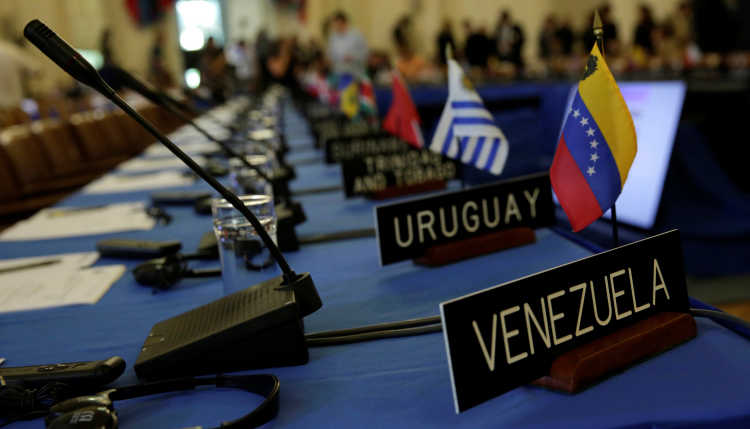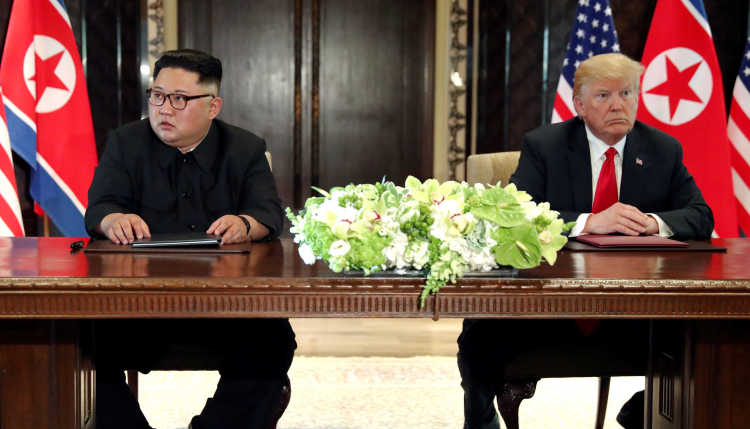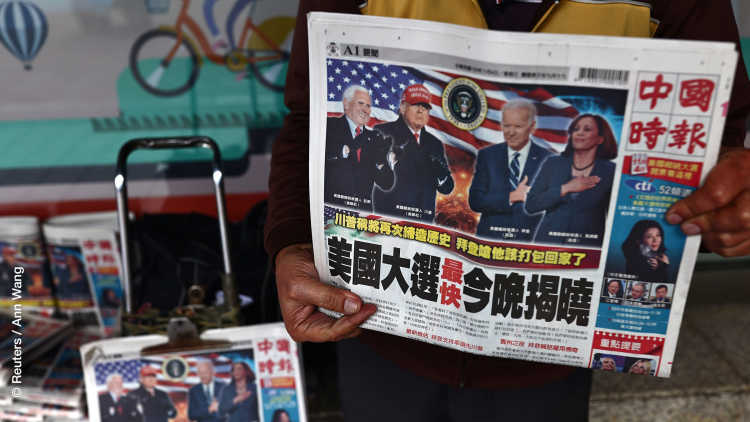- Home
- Publications
- GIGA Focus
- Joe Biden and a New Era of Multilateralism
GIGA Focus Global
Joe Biden and a New Era of Multilateralism
Number 5 | 2021 | ISSN: 1862-3581

With the inauguration of Joe Biden, the United States once again extends its hand to – relieved but wary – traditional partners and embraces the concept of strategic competition with Russia and China. The European Union sees more room for cooperation especially with China, which may, however, come with significant long-term costs. The hardening of fronts between democratic and authoritarian countries seems likely.
Even though the US wants to “earn back its position of trusted leadership,” the EU and other partners have become wary of the North American country’s reliability, as the political forces that brought Donald Trump to the presidency remain strong. Further, even though the US is pushing for a tougher stance against China, the EU is rather divided and has vested interests in continuing cooperation.
China and Russia have become increasingly aggressive, as the Crimea annexation, building of artificial islands with military bases in the South China Sea, and border clashes between Indian and Chinese military all showcase. China is increasingly weaponizing its economic power to exert influence on foreign countries such as Australia and continues to deny the existence of human rights abuses at home.
Selective decoupling by the US, and to some extent by the EU, has started. The latter for example recently established the European Raw Materials Alliance to become less dependent on imports.
The search for values-based alliances has begun as well. For instance, France and Germany initiated the Alliance for Multilateralism in 2019 to strengthen the rules-based international order. Partnerships with non-traditional allies from the Global South are crucial to help the multilateral liberal order survive, although it may lead to bloc-building between democratic and authoritarian regimes.
Policy Implications
The rise of China will be the key determinant of international politics for decades to come. Continuing to cooperate with the country may come at great risk, as it helps an authoritarian regime to attain the status of global superpower – one that does not share democratic values and dismisses international law. The EU – but also other countries – will likely need to choose between emphasising a values-based or an all-inclusive multilateralism.
Resetting Multilateralism
In January 2021 Joe Biden was sworn in as the new president of the United States. His political programme stands in stark contrast to that of his predecessor, Donald Trump, both domestically as well as internationally. The “America First” dogma, many said, had come to an end. The crisis of multilateralism – traditional backers withdrawing their support and a rising China challenging the rules-based international order – can be resolved with the US now its champion once again.
Indeed, the Biden administration has been busy extending its hand to European partners, recommitted to the World Health Organization, and re-entered the Paris Agreement. At the Munich Security Conference in February 2021, the new president stressed that the US is determined to re-engage, consult with Europe, and that the country wanted “to earn back our position of trusted leadership” (Biden 2021). Together, both Europe and the US must show that the democratic model is the best means of confronting the global challenges of today, and they must stand together in taking on “strategic competitor” China (as well as Russia). He also stressed that this competition is not about a conflict of East versus West: it should not bar cooperation on common issues such as pandemics and climate change. This speech was clearly intended to reinvigorate some of the lost confidence of the Western world in its own continued importance (the title of the previous MSC conference in 2020 – “Westlessness” – may speak for itself). It was also intended as a message to China and Russia that the West is back, and that it will not shy away from (non-military) confrontation.
The world that Biden envisioned in his speech may not, however, be the one humanity is heading towards. The assertion that East versus West competition is not about bloc-building may even be the best indicator that, indeed, the world is heading exactly in this direction. With Xi Jinping tightening his grip on power (he now can remain president for life), China has become increasingly aggressive towards other countries, as its “wolf warrior diplomacy,” island-building in the South China Sea, and border clashes with neighbouring India all showcase. It is also increasingly using its economic power to exert influence on foreign countries such as Australia, continues to deny the existence of human rights abuses in the Xinjiang region, and is building new nuclear-missile bases. The tone of the new US administration towards China has been harsh, and Sino–US relations have starkly deteriorated since Biden took office, with China showing no signs of bowing to US pressure. While the US continues to openly challenge China and rallies its allies to follow suit, the European Union is more divided and, so far at least, has mostly remained willing to see the authoritarian country as a partner as well as a competitor. Other countries may already be strategically choosing with which bloc they will cooperate – a democratic West or an authoritarian China.
Two Competing Narratives on Multilateralism
One can identify two broad narratives on multilateralism: “reanimate and reinforce” and “restructure” respectively (Narlikar 2021). The first identifies deviations from the rules-based order by individual states as the root cause of the multilateral system’s recent problems in effectively handling global challenges. Consequently, solving current problems simply requires more commitment by individual states: for example by increased funding for institutions such as the WHO, or by reforming deadlocked ones such as the World Trade Organization (WTO).
The second narrative, “restructure,” calls for fundamental revision of the multilateral order, as it was the current system that led to a crisis of multilateralism in the first place. For instance, the promotion of global value chains by the WTO has created opportunities to weaponize interdependency (Farrell and Newman 2019). The rules need to be adapted to account for the fact that hostile actors can exploit economic ties. This second narrative emphasises national interests, weaponised interdependence, and values as fundamental guidelines for foreign policy, and suggests the formation alliances of like-minded states in specific areas of cooperation – that is, partial and gradual decoupling from rivals alongside deeper integration with trusted partners (Narlikar 2021).
While the EU seems to be more inclined to follow the first narrative, “reanimate and reinforce,” the US seems set to follow the second instead – although there are some signs that the EU is now shifting its stance slightly. For instance, at the North Atlantic Treaty Organization (NATO) summit in June 2021 the heads of states agreed to update the military alliance’s strategic concept for the first time since 2010. The threats posed by Russia and China to security and the rules-based international order featured prominently in the meeting’s communiqué. Meanwhile, China is gaining influence vis-à-vis moulding the multilateral order: It heads four out of 15 specialised agencies, is the second-largest contributor to the United Nations budget, and can count on the support of many lower-income countries – in part due to their dependency on Chinese credit. From a values-based perspective, it is highly problematic that an authoritarian country, one with proven human rights abuses (see, for example, Zenz 2020), is gaining such a powerful position within global multilateral decision-making. The “reanimate and reinforce” narrative seems to be founded on the hope that China will someday commit to basing its foreign policy on international law – something that remains highly questionable.
US–China Competition
The main concern on the international stage, as seen from the vantage point of the US, can be simplified down to the following: An authoritarian regime with tremendous digital-surveillance capabilities is on its way to becoming a superpower and therewith rival to US supremacy, acting increasingly aggressively in the process. This is seen as both dangerous from a security perspective as well as undesirable from a normative point of view. Further, its economic relationship with China is widely regarded as unfavourable for the North American country. The US wants to rein in the authoritarian regime.
The first high-level diplomatic meeting between the Chinese and the Biden administrations in March 2021 began with a war of words. The US secretary of state accused China of threatening the “rules-based order that maintains global stability,” while the head of the Chinese delegation accused the US of a “Cold War mentality” and of agitating other countries to “attack” China (Sevastopulo and Mitchell 2021). Both before the meeting and since, the two sides would apply multiple tit-for-tat sanctions on individuals. Meanwhile, the US has breathed new life into the QUAD (Quadrilateral Security Dialogue), a strategic dialogue on security issues mainly intended to curb the growing influence of China. Made up of the US, Japan, Australia, and India, QUAD published a statement in early 2021 in which its member countries proclaimed “a shared vision for a free and open Indo-Pacific” (QUAD 2021), and also invited representatives of New Zealand, South Korea, and Vietnam to attend a QUAD Plus meeting.
The US strategy – continuously voicing concerns over human rights abuses and military activity, as well as increased co-ordination with (potential) allies – has so far not been effective in changing Chinese behaviour. On the contrary, the latter has pushed back not only with propaganda (such as emphasising systemic superiority in handling the COVID-19 pandemic) but also continues with, for example, its military incursions into Taiwan’s air defence identification zones. The Chinese wish for reunification – or annexation – is widely regarded as the most imminent factor likely to give rise to a war between the two superpowers, as Biden has repeatedly emphasised that US support for Taiwan remains steadfast. In June, a military plane landed in Taiwan for the first time since 1995, bringing with it a delegation of both Republican and Democratic members of Congress, provoking an outcry among Chinese officials and further incursions by Chinese aircraft. A senior Chinese diplomat recently commented that Sino–US relations are at a “deadlock” (Mitchell and Sevastopulo 2021).
The EU Is Trying to Find Its Own Position
One could almost hear the sigh of relief in most European capitals when the results of the US elections were announced. At last, the erratic foreign policy of the outgoing Trump had come to an end. However, even if the current US administration does manage to assume a leadership position in the West once more, recent developments in domestic politics have made traditional partners wary. There is no guarantee that US leadership will not eventually revert back to a foreign policy à la Trump, as the political forces that previously brought the latter to power remain strong. The next presidential elections might bring with them another US withdrawal from multilateralism. For now, both sides seem able to reach compromises on difficult-to-solve foreign policy issues – as the agreement on the Nord Stream 2 situation or the recently announced global agreement for corporate taxes showcase. However, the hasty removal of NATO troops from Afghanistan also highlights a lack of common strategic planning. Further, EU member states are seeking more strategic autonomy: French president Emmanuel Macron recently called for the EU to assume more responsibility for the security issues in its neighbourhood, for instance.
The EU (or most of it) views China as a partner as well as a competitor and strategic rival, with some countries emphasising the partnership and others the rivalry. In recent months, the position seems to have shifted somewhat towards out-and-out rivalry – at least in Brussels. After tit-for-tat sanctions against individuals that started with the EU imposing such measures on Chinese officials for their involvement in running internment camps in the Xinjiang region, the ratification of the Comprehensive Investment Agreement (under negotiation since 2013) is now on hold. Further, some individual EU member states have recently moved away from China. Italy has shifted its focus away from Chinese investments, and towards Europe and the US instead, under new prime minister Mario Draghi for instance (Johnson, Ghiglione, and Sciorilli 2021).
Germany recently published a White Paper on Multilateralism (The Federal Government 2021), in which it underscores its determination to defend a rules-based multilateral order, denounces violations of international law and the weakening of the institutions that enforce it, and lays out a strategy to strengthen the multilateral system by supporting existing institutions like the UN, initiating reforms, and resorting to alliances with like-minded partners where necessary. Still, even though China features prominently in this strategy paper, a clear stance on the difficult trade-off between security concerns and economic opportunities is missing. National elections in September 2021 will likely not lead to a change in Germany’s position towards China. Armin Laschet, frontrunner for the chancellorship of the German CDU, recently emphasised that China is as much an ally as it is a systemic rival. Likewise Olaf Scholz, frontrunner of the SPD, does not seem to be willing to confront the authoritarian regime either. However the Greens, who also have a shot at government participation under Annalena Baerbock, seem to be willing to engage in systemic conflict with authoritarian regimes according to their election programme. It remains to be seen how much of the latter the Greens will be able to push through in a potential coalition with the CDU, SPD, and/or other parties.
Economic interests contribute to the EU’s view that China also needs to be seen as a partner, as it is the bloc’s second-biggest trading partner. So far, the relationship has been asymmetrical, with the EU granting (state-subsidised) Chinese firms access to its markets, while China remains relatively closed to foreign actors, capital, as well as ideas (Benner et al. 2018). Rising geopolitical tensions are already affecting the operations of European businesses currently in China, but in a way different to the one that might be expected. Many have deepened their engagement in China despite the continuation of forced technology transfers (Liu and Liu 2021). Close to 60 per cent of European businesses are expanding their operations in China according to the European Chamber of Commerce. Part of the reason for this expansion is to separate supply chains and move as many of them as possible into China itself in order to retain access to this lucrative market going forwards – with many firms expecting a decoupling of economic ties between China and the US, and possibly between China and the EU too. This increased engagement by European firms likely exacerbates the EU’s reluctance to take a tougher stance against China.
On the one hand, there are increasing signs that the bloc is seeking to lessen its dependence on China at least in strategically important industries such as the production of semiconductors and rare earths; most countries have banned the Chinese technology firm Huawei from contributing to the roll-out of 5G networks too. Processes in other policy areas are underway as well. Germany, during its EU Council Presidency, initiated the development of a Strategic Compass for security and defence, seeking to establish a common understanding of foreign threats to the EU among member states, and to explore ways in which the bloc can be a security provider. On the other hand, large countries (like Germany) are clinging to the idea of treating China as both a partner and a rival due to vested interests. Still other EU members, most notably Eastern European countries, have even deepened their cooperation with China via the “16+1” initiative, a Chinese forum used to strike deals with individual countries with an emphasis on investment in infrastructure and advanced technologies. A divided EU cannot act decisively, which is probably in China’s interest (for an overview of China’s influencing efforts in and on Europe, see Benner et al. 2018).
The Search for Like-Minded Partners Has Begun
Aligning with like-minded countries beyond traditional partners will prove necessary for both the US and EU to successfully defend a values-based international order. The search for new partners is especially important in case the US once again withdraws. To sway other countries, to regain some of the recently lost political capital, and to outcompete China as a development model, the actions of the EU and the US need to be consistent with their core values to inspire the trust on which alliances can be built. They also need to deliver solutions to concrete problems. Providing rapid access to COVID-19 vaccines to countries of the Global South would, for instance, send a strong signal.
Initiatives like the QUAD, the Alliance for Multilateralism (an informal network of like-minded states launched by France and Germany), or the German White Paper on Multilateralism – which specifically emphasises that more and more countries are making legitimate claims to having a say in and helping to shape the international order, and that civil society is also calling for greater participation too – indicate that that the search for partners is underway. The forming of alliances also indicates that bloc-building – with democracies on the one side and authoritarian regimes on the other – has started. For instance, China was very quick to establish friendly relations with the Taliban after the withdrawal of NATO troops in August 2021. Other countries may already be strategically choosing their alignments.
Confronting the Challenges of the Tectonic Shift in Geopolitics
The multilateral liberal order is undergoing a tectonic shift due to China’s rise. Its increasingly aggressive behaviour rightfully worries both countries in the latter’s immediate neighbourhood and beyond. Taking past behaviour as an indication of future choices, one has every reason to believe that China will continue to break promises and rules at will. While the US is willing to confront the authoritarian regime rather openly under Biden, it may be time for the EU to toughen its stance, as it seems risky to continue making deals such as the Comprehensive Investment Agreement. Such deals convey legitimacy and contribute to China’s economic rise, while it remains questionable whether the latter will keep up its end of the bargain. Selective decoupling may come with some economic costs (see also, Felbermayr et al. 2021). However, gains in security and the survival of liberal values may well compensate for this (see also, Narlikar 2021).
To develop a more coherent foreign policy and thus be capable of acting effectively in this new era of multilateralism, the EU needs to overcome its internal divisions regarding China policy. This entails acknowledging the changes in the geopolitical landscape, reassessing the one-sided relationship with China, as well as convincing member states that a united EU also lies in their own interest in this new era of multilateralism. The EU should urge members of the 16+1 format to follow Lithuania in abandoning the China-led initiative. One way to foster a common policy stance would be to strengthen existing dialogue processes as well as establish new ones, both within and among states, on how to balance the sometimes-difficult trade-off between a values-based foreign policy and a pragmatic one. Another way forward may be to remove the need for unanimity: Heiko Maas, Germany’s foreign minister, recently argued that the EU must abandon the veto right for its foreign policy to become capable of acting (Maas 2021), but such a move seems out of reach for the foreseeable future, and may be counterproductive to fostering unity among member states.
Another reason to rethink the engagement with China – and especially the view that one can cooperate in some areas while competing in others – is the risk that domains wherein cooperation is needed will subsequently be used as leverage in other policy arenas. Take, for instance, the issue of greenhouse gas emissions. China continues to build coal-fired power plants, adding around 3 per cent capacity per year, and produced more than half of the world’s total coal-fired electricity in 2020 (IEA 2020). Its carbon-market scheme is expected to yield only limited reductions in greenhouse gas emissions meanwhile (Gray 2021). Taking China at its word that it will reduce carbon emissions allows the Chinese administration to make reductions conditional on concessions in other policy areas. Instead, the US, the EU, and other partners could form a “climate club” with a common carbon border adjustment mechanism, and thereby economically incentivise China to reduce emissions while taking away a lever through which the latter can impose its will upon others (see also, Erickson and Collins 2021).
At the same time, one should be careful not to close the door on cooperation completely, as this may result in open conflict. Yet, the spectre of war should not lead to overly cautious behaviour: While hedging risks by avoiding a tougher stance on China may seem like a sensible strategy that protects the EU’s economic interests and avoids confrontation, it also helps the authoritarian regime to surpass the US and become the new global superpower – one openly dismissive of the idea of universal human rights. The real-world consequences hereof are impossible to predict. From a values-based perspective, however, such an outcome is extremely undesirable.
Footnotes
References
Benner, Thorsten, Jan Gaspers, Mareike Ohlberg, Lucrezia Poggetti and Kristin Shi-Kupfer (2018), Authoritarian Advance – Responding to China’s Growing Political Influence in Europe, GPPi and MERICS.
Biden, Joe (2021), Remarks by President Biden at the 2021 Virtual Munich Security Conference, München, 19 February, www.whitehouse.gov/briefing-room/speeches-remarks/2021/02/19/remarks-by-president-biden-at-the-2021-virtu al-munich-security-conference (11 August 2021).
Erickson, Andrew S., and Gabriel Collins (2021), Competition with China Can Save the Planet, in: Foreign Affairs, 100, 3, May-June, 136ff.
Farrell, Henry, and Abraham L. Newman (2019), Weaponized Interdependence: How Global Economic Networks Shape State Coercion, in: International Security, 44, 1, 42–79.
Felbermayr, Gabriel, Steffen Gans, Hendrik Mahlkow, and Alexander Sandkamp (2021), Decoupling Europe, Kiel Policy Briefs 153.
Gray, Matthew (2021), Turning the Supertanker – Powering China’s Coal to Clean Transition with Actionable Analytics, TransitionZero, https://www.transitionzero.org/insights/turning-the-supertanker. (11 August 2021).
IEA (2020), Electricity Market Report December 2020, Paris, France: International Energy Agency.
Johnson, Miles, Davide Ghiglione, and Silvia Sciorilli (2021), Mario Draghi Sets Tone in Cooling EU-China Relations, in: Financial Times, www.ft.com/content/4d7bf8ad-f585-44b2-9250-790ec430de4b (11 August 2021).
Liu, John, and Yujing Liu (2021), European Companies to Invest More in China After Pandemic, in: Bloomberg News, www.bloomberg.com/news/articles/2021- 06-08/european-companies-plan-to-invest-more-in-china-after-pandemic (11 August 2021).
Maas, Heiko (2021), Speech by Foreign Minister Heiko Maas at the Opening of the 19th Ambassadors Conference “Build Back Better – Foreign Policy for the Post-COVID World”, Berlin, 7 June, www.auswaertiges-amt.de/en/newsroom/news/maas-ambassadors-conference-2021/2465098 (11 August 2021).
Mitchell, Tom, and Demetri Sevastopulo (2021), China Says US Relations at a ‘Deadlock’ in High-Level Talks, in: Financial Times, www.ft.com/content/7e9854b9-b821-495f-a217-44c636606732 (11 August 2021).
Narlikar, Amrita (2021), Emerging Narratives and the Future of Multilateralism, in: Samir Saran and Preeti Lourdes John (eds.), Raisina Files 2021 - A Viral World: Can We Respond?, New Delhi, India: Observer Research Foundation, 11–23.
QUAD (2021), Quad Leaders’ Joint Statement: “The Spirit of the Quad”, 12 March, www.whitehouse.gov/briefing-room/statements-releases/2021/03/12/quad-leaders-joint-statement-the-spirit-of-the-quad (11 August 2021).
Sevastopulo, Demetri, and Tom Mitchell (2021), US and China Trade Barbs at Start of Alaska Meeting, in: Financial Times, www.ft.com/content/0b71b440-49b8-42e8-993e-9a58bc3b5da3 (11 August 2021).
The Federal Government (2021), A Multilateralism for the People, Berlin, Germany.
Zenz, Adrian (2020), Sterilizations, IUDs, and Mandatory Birth Control: The CCP’s Campaign to Suppress Uyghur Birthrates in Xinjiang, Washington: Jamestown Foundation.
General Editor GIGA Focus
Editor GIGA Focus Global
Editorial Department GIGA Focus Global
Regional Institutes
Research Programmes
How to cite this article
Greve, Hannes (2021), Joe Biden and a New Era of Multilateralism, GIGA Focus Global, 5, Hamburg: German Institute for Global and Area Studies (GIGA), https://nbn-resolving.org/urn:nbn:de:0168-ssoar-75133-8
Imprint
The GIGA Focus is an Open Access publication and can be read on the Internet and downloaded free of charge at www.giga-hamburg.de/en/publications/giga-focus. According to the conditions of the Creative-Commons license Attribution-No Derivative Works 3.0, this publication may be freely duplicated, circulated, and made accessible to the public. The particular conditions include the correct indication of the initial publication as GIGA Focus and no changes in or abbreviation of texts.
The German Institute for Global and Area Studies (GIGA) – Leibniz-Institut für Globale und Regionale Studien in Hamburg publishes the Focus series on Africa, Asia, Latin America, the Middle East and global issues. The GIGA Focus is edited and published by the GIGA. The views and opinions expressed are solely those of the authors and do not necessarily reflect those of the institute. Authors alone are responsible for the content of their articles. GIGA and the authors cannot be held liable for any errors and omissions, or for any consequences arising from the use of the information provided.






































